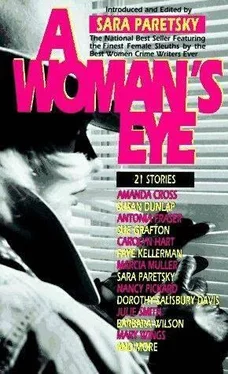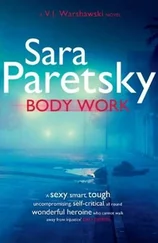Sara Paretsky - A Woman’s Eye
Здесь есть возможность читать онлайн «Sara Paretsky - A Woman’s Eye» весь текст электронной книги совершенно бесплатно (целиком полную версию без сокращений). В некоторых случаях можно слушать аудио, скачать через торрент в формате fb2 и присутствует краткое содержание. Жанр: Триллер, на английском языке. Описание произведения, (предисловие) а так же отзывы посетителей доступны на портале библиотеки ЛибКат.
- Название:A Woman’s Eye
- Автор:
- Жанр:
- Год:неизвестен
- ISBN:нет данных
- Рейтинг книги:3 / 5. Голосов: 1
-
Избранное:Добавить в избранное
- Отзывы:
-
Ваша оценка:
- 60
- 1
- 2
- 3
- 4
- 5
A Woman’s Eye: краткое содержание, описание и аннотация
Предлагаем к чтению аннотацию, описание, краткое содержание или предисловие (зависит от того, что написал сам автор книги «A Woman’s Eye»). Если вы не нашли необходимую информацию о книге — напишите в комментариях, мы постараемся отыскать её.
A Woman’s Eye — читать онлайн бесплатно полную книгу (весь текст) целиком
Ниже представлен текст книги, разбитый по страницам. Система сохранения места последней прочитанной страницы, позволяет с удобством читать онлайн бесплатно книгу «A Woman’s Eye», без необходимости каждый раз заново искать на чём Вы остановились. Поставьте закладку, и сможете в любой момент перейти на страницу, на которой закончили чтение.
Интервал:
Закладка:
And that happening was when the music changed. I was right beside Voss. So I danced with Voss. Close tight, chest to chest, feeling him surrounding me. Engulfing me. Almost as if I were an integral part of his body. For those few moments.
I was nothing to him. Not a happening to him. It was simply the way he danced. To him that was the happening. To dance. As if dancing were created by him, for him.
Except Elektra. When he danced with Elektra they were one person. Not two dancing. One. Transformed. Two become one. Tightly together. Never again one and one. Two melded. Like by flame. The flame of movement and music.
My cousin Katty was sixteen going on seventeen. She and her very best Mends-four or five of them-would have none of Voss. He wasn’t privileged. Their cant word of the summer. He worked in a butcher shopl Henschel’s Butcher Shop. His uncle Gus. Underprivileged. As if Voss had blood spattered all over his clothes. Like Uncle Gus had on his white apron when he waited on my aunt Georgie. In those days in a small town, meat didn’t come prepackaged and iced by Armour or Swift. It came from a nearby farm. The farmer butchered and brought the haunch to the butcher shop. It was hung in an icebox room out back. The butcher cut from the haunch what the customer wanted. Sometimes blood would spatter on his white apron.
Voss worked mostly at the front counter. By the cash register. By the big front window.
But the girls shrieked “underprivileged” when I asked about him. The girls accepted only the privileged. Like Katty’s choice for the summer, Roddy Rockefeller. No, not the rich Rockefellers with the wizened old golfer who gave a dime-a-day tip to his caddy. Rockefeller is a common name in upstate New York.
“What’s Claude?” I asked them. Deliberately to provoke them. Claude had to be privileged. He was a Clark. Founders of Clarksvale back in Revolutionary days. His father was owner and president of the bank. The one where Aunt Georgie used to work and now owned a big piece of.
Of course they shouted with laughter at my question. “Whey-face?” I did not ever understand “Whey-face.” He had a round doughy face. Something about curds and whey.
They added their other names for him. “Toady.” “Cipher.” And one daring friend of Katty’s who considered herself sophisticated, “Faggotty.”
Voss let Claude hang around. That was about all. Voss was a loner. He didn’t have friends. Didn’t want them.
We went back to the village every other summer. We-my mother, the children-my eight-year-old brother and six-year-old sister, and me. My father wanted us to know his people. He didn’t come with us. He had his business as excuse. He had had enough of villages before he walked away from them to make his mark in the city. And did, all the way to California.
Every other summer we took the train-there were trains in those days-from California to New York, upstate New York, Change at Chicago to the N.Y. Central. Disembark at Albany. But not for the local train. Met there by Aunt Georgie and her chauffeur Fred. He was one of the garage men in a chauffeur cap. We stayed with Aunt Priscilla. George was the younger sister by two years. She was the businesswoman. She owned half the town by now. Aunt Priscilla was the stay-at-home who took care of her kinfolk’s children.
Katherine-Katty-had always lived with Aunt Pris. Her mother died in childbirth and her father was in the air corps, a captain or something. He wasn’t on land very often.
This summer Aunt Pris also had the Tompkin boys. Their father, a nephew, was an archaeology professor at one of the universities, and so was his wife. They were off to some big dig deep in South America. No place to take little boys. The boys were around my brother’s age.
I shared Katty’s room in summer and we didn’t see much of the children. Not if we could help it.
The village itself was a happening. For a girl born and raised in a big city, it was like a storybook holiday. Walking around town. No traffic. No streetcars. No buses. A post office with its walls of neat little golden boxes. An ice-cream parlor with tables and chairs.
And every Saturday night there was dancing on the pavilion in the town park. Which was how a fourteen-year-old came to dance with an older young man. That summer at Quichiquois. That summer of Elektra.
An open pavilion up a flight of steps to raise it above the park benches and the paths below. The pavilion was also the bandstand. The band played there in summer every night. Except Saturday. On Saturday night there was an orchestra, a real orchestra. Live music, it is called today. Miss Estelle had for some twenty-five years taught classical piano to all the children of the village whose parents were music minded, but on Saturday night in summer she played mean jazz. Deacon Raven of some local church played violin for the service. For dancing at the pavilion, he played a jazz fiddle. The drummer was the owner of the local hay-and-feed store. He was in the National Guard band. On special occasions, the city fathers would enlist a clarinet player, a young farmer up the road a piece who played in his college band. Musicians who aren’t professionals have a certain spirit. They play for the love of it, certainly not for the pittance they are paid.
Everyone danced. Little children capered with one another. Or now and again politely waltzed with their mums or dads. Even the grampaws and gramaws sashayed around the floor.
And I danced with Voss. A happening only that once. Although after that night the older girls taught me how to lag, Without appearing to lag. No one would know you were looking for one specific partner, When you saw him you would lag a step here or there until he was almost beside you, Katty and I would practice it at night in her bedroom, But I never had a chance to try it out for real.
Because Aunt George decided. She made all the decisions in the family. Aunt Priscilla acquiesced or did not. If she did not, it was the end of that happening. Aunt Pris was a woman of few words. Quietly spoken. Aunt Georgie was the talker. Emphatic. Accurate. Almost always. A businesswoman, accustomed to dealing with men. With yea and nay. No palavering.
She decided that the children should have three weeks at Lake Quichiquois. There are myriad small lakes all through the Berkshires. This was nearest to Clarksvale, about twenty miles. No resort. Just summer cottages. Friends of Aunt George offered theirs as they were going north to visit family for several weeks. The cottages were in the woods above the lake. Each was surrounded by woods, land was not costly, everyone had privacy. Just comfortably set far enough apart.
Aunt Priscilla acquiesced. My mother, being company, had no yea or nay. My mother preferred the busiest city street to the beauties of the woods. Not to the beauty but to the creatures that came with it, flies and spiders and bees and creepy crawlers. But my mother was company. Polite. Company was expected to acquiesce.
Of course, Aunt Georgie wasn’t going. Shut up for three weeks surrounded by children? Like my father, she had business excuses.
After her decision, Aunt Georgie said, “I have a hired girl to go along. No sense of you and Elizabeth [my mother] turning your holiday into a wash and iron and cook for six children.”
Aunt Priscilla was wary. “Who is the hired girl?”
“I hired Elektra.” Aunt Georgie slid the name off her tongue as if she just recalled it.
A look. From one to another of the aunts. And returned the other to the one. Aunt Pris decided, half-reluctantly, “Well, she’s as good as we could hope for this late in the summer.”
Imperceptible. Aunt George had been apprehensive. Priscilla could have said no. She hadn’t. Now Aunt Georgie could resume her position as head of the family. In name. She paid the bills.
Читать дальшеИнтервал:
Закладка:
Похожие книги на «A Woman’s Eye»
Представляем Вашему вниманию похожие книги на «A Woman’s Eye» списком для выбора. Мы отобрали схожую по названию и смыслу литературу в надежде предоставить читателям больше вариантов отыскать новые, интересные, ещё непрочитанные произведения.
Обсуждение, отзывы о книге «A Woman’s Eye» и просто собственные мнения читателей. Оставьте ваши комментарии, напишите, что Вы думаете о произведении, его смысле или главных героях. Укажите что конкретно понравилось, а что нет, и почему Вы так считаете.












